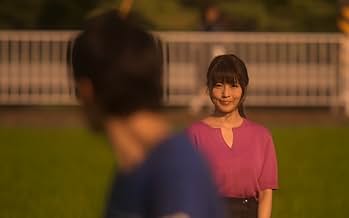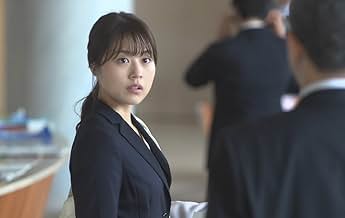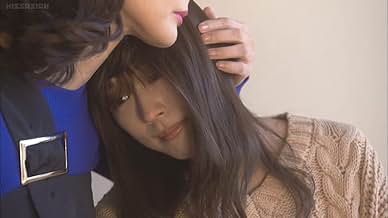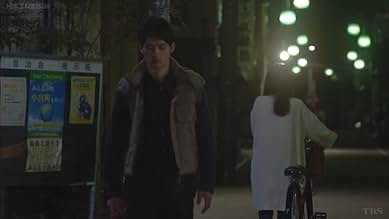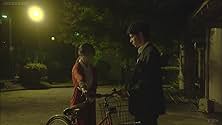Le emozioni riaffiorano quando un'insegnante di scuola e il suo ex studente si riavvicinano tre anni dopo aver condiviso un'attrazione proibita che li ha segnati entrambi.Le emozioni riaffiorano quando un'insegnante di scuola e il suo ex studente si riavvicinano tre anni dopo aver condiviso un'attrazione proibita che li ha segnati entrambi.Le emozioni riaffiorano quando un'insegnante di scuola e il suo ex studente si riavvicinano tre anni dopo aver condiviso un'attrazione proibita che li ha segnati entrambi.
Sfoglia gli episodi
Recensioni in evidenza
Basically she is a teacher with " passion" for teaching. At the age of "15" she shd have guided her student to complete his education at any cost first and then think about other things. When she realizes infatuation of one of her students aged 15, she was ,"25" quite old enough to understand the implications. In due course too she just gives her love as "excuse" as her co worker rightly points out. Age gap might not be deterrent but in that case both shd be ADULTS with their heads firmly on their shoulders. Here the boy is still high schooler? Fanning his feelings is CRIMINAL. She shd have refrained and guided him properly as TEACHER. Rather than doing the correct thing she keeps on justifying her misendevour. Plus she had her ex by her side who has been shown to be a dependable rational person. Rather than going with him this selfish in late 20s teacher keeps on seducing her student!
Irrational and criminal!
It seems that rather director WANTS it this way just for (?) cheap sensationalism.
Irrational and criminal!
It seems that rather director WANTS it this way just for (?) cheap sensationalism.
Another May-December or Noona romance story, but I would like to comment on parent-children relationship depicted in this film that stood out for me. What kind of a frustrated parent it takes to deliberately inflict pain on their child? One parent deliberates on depriving their unborn baby of the father, another parent torments their child prioritising the parent's own emotional needs, the third parent torments their child by hiding father's letters and prohibiting the budding feelings of love, and the fourth parent at some point alienates their own adult child. Are we dealing with some massive phenomenon of emotional abuse of children in the family or is it a cultural "thing" or perhaps generational? "You aren't wrong about this. You only did what any parent would do. [...] It's OK. People always grow stronger through hardships. They are all precious experiences. It's sure to help in his life ahead." What kind of philosophy is this, furthermore, coming from the lips of a teacher? What is OK or precious about it?
So the story develops against this backdrop with the hope for the future that somehow children who go through this will acquire cognitive sophistication to navigate interpersonal relationship.
So the story develops against this backdrop with the hope for the future that somehow children who go through this will acquire cognitive sophistication to navigate interpersonal relationship.
When I started it, I didn't know what to expect from the story ( I thought boy would be 18 and even if he had feelings for the teacher, he would confess after few years or something) but boom, not at all like it, everything happens so quickly.
The teacher is very sweet, friendly and cheerful ( trying her best ) and the student ( 15 years old) is complicated ( haha not bad personality, little tired of family drama I guess ). I was in shock how their relationship gradually built ( it is definitely shocking).
I believe if the teacher was more strict, such situation would not arise ( she literally fell for him instantly which seems disappointing, like one should atleast have discipline and professionalism).
The storyline takes many unpredictable turns so it's interesting. It was definitely not at all boring ( a good binge watch) but I believe the concept is very controversial.
The teacher is very sweet, friendly and cheerful ( trying her best ) and the student ( 15 years old) is complicated ( haha not bad personality, little tired of family drama I guess ). I was in shock how their relationship gradually built ( it is definitely shocking).
I believe if the teacher was more strict, such situation would not arise ( she literally fell for him instantly which seems disappointing, like one should atleast have discipline and professionalism).
The storyline takes many unpredictable turns so it's interesting. It was definitely not at all boring ( a good binge watch) but I believe the concept is very controversial.
In the drama about a student-teacher love relationship, female teachers are generally very weak, pitiful, and very feminine. They are the incarnation of truth, goodness, and beauty, but they are often misunderstood. As a result, in some ways, they are not happy. At the same time, they are kidnapped by society's expectations of women. Although they often choose to tolerate, in fact, deep in their hearts, they are still very rebellious. Breaking free from all shackles and falling in love with students is a very "rebellious" choice.
The audience would like to think Hijiri is so good, why should people bully her? Why is the love process of these two lovers so complicated and difficult? If you like each other, why can't you be together? Finally: what did they do wrong? Nothing wrong. But if we set aside these settings, will the audience really support them? Not necessarily. I think that it is okay to have this kind of relationship in artworks, but it is a bit difficult to do so in reality.
I don't personally like the ending. In reality, the possibility of always liking someone without contact is very low. However, this is a fairy tale anyway. The village flowers are beautiful, and Kuroiwa-Kun is handsome. The breath of youth, the perfect fairy tale accompanied with Uru's beautiful BGM, and Du Fu's Delighting in Rain on a Spring Night are a perfect match. Who has heard of fairy tales that are hurtful? Well, it's called a fable......
At least all the teacher-student relationships I know are fairy tales. But fairy tales are also good and average. At least it's worse than "High School Teacher" and "Majo no jouken". But it's definitely better than all kinds of movies adapted from other comic books.
The audience would like to think Hijiri is so good, why should people bully her? Why is the love process of these two lovers so complicated and difficult? If you like each other, why can't you be together? Finally: what did they do wrong? Nothing wrong. But if we set aside these settings, will the audience really support them? Not necessarily. I think that it is okay to have this kind of relationship in artworks, but it is a bit difficult to do so in reality.
I don't personally like the ending. In reality, the possibility of always liking someone without contact is very low. However, this is a fairy tale anyway. The village flowers are beautiful, and Kuroiwa-Kun is handsome. The breath of youth, the perfect fairy tale accompanied with Uru's beautiful BGM, and Du Fu's Delighting in Rain on a Spring Night are a perfect match. Who has heard of fairy tales that are hurtful? Well, it's called a fable......
At least all the teacher-student relationships I know are fairy tales. But fairy tales are also good and average. At least it's worse than "High School Teacher" and "Majo no jouken". But it's definitely better than all kinds of movies adapted from other comic books.
In my 24 years of existence, I've never experienced romantic love... but somehow I feel like I just did after watching Meet Me After School.
Watching this has been an absolute emotional roller coaster for me. Despite the fact that I have different views regarding the topic that it tackled, the story managed to make me sympathize for Hijiri and Akira. The way the story unfolded was very realistic. The theme wasn't glamorized at all and both of the main characters dealt with the repercussions of being in such predicament, and the supporting characters' reactions were all logical and fairly reasonable.
There were 3 things I truly loved the most about this series. First would be the stellar performances of the cast members (Kasumi I'm a new fan!). They all brought something to the table and I really loved their chemistry with each other, especially Kasamu with Kenshi. There were scenes between their characters that were so arresting (no pun intended lol) and melancholic that I kept replaying. I also loved Haraguchi and her empowering speeches to Hijiri. Second would be the gorgeous cinematography that showcased the picturesqueness of rural Japan that made me wish I resided there. And last but definitely not the least, would be the catchy OST and melodious background scores that captured the scenes- the series overall- perfectly.
10/10 for all the distress and butterflies. Will definitely be rewatching.
Watching this has been an absolute emotional roller coaster for me. Despite the fact that I have different views regarding the topic that it tackled, the story managed to make me sympathize for Hijiri and Akira. The way the story unfolded was very realistic. The theme wasn't glamorized at all and both of the main characters dealt with the repercussions of being in such predicament, and the supporting characters' reactions were all logical and fairly reasonable.
There were 3 things I truly loved the most about this series. First would be the stellar performances of the cast members (Kasumi I'm a new fan!). They all brought something to the table and I really loved their chemistry with each other, especially Kasamu with Kenshi. There were scenes between their characters that were so arresting (no pun intended lol) and melancholic that I kept replaying. I also loved Haraguchi and her empowering speeches to Hijiri. Second would be the gorgeous cinematography that showcased the picturesqueness of rural Japan that made me wish I resided there. And last but definitely not the least, would be the catchy OST and melodious background scores that captured the scenes- the series overall- perfectly.
10/10 for all the distress and butterflies. Will definitely be rewatching.
Lo sapevi?
- QuizBased on manga series "Chugakusei Nikki" by Junko Kawakami (first published 2013 in manga magazine Feel Young).
I più visti
Accedi per valutare e creare un elenco di titoli salvati per ottenere consigli personalizzati
- How many seasons does Meet Me After School have?Powered by Alexa
Dettagli
- Data di uscita
- Paese di origine
- Lingua
- Celebre anche come
- Meet Me After School
- Azienda produttrice
- Vedi altri crediti dell’azienda su IMDbPro
- Tempo di esecuzione57 minuti
- Colore
Contribuisci a questa pagina
Suggerisci una modifica o aggiungi i contenuti mancanti

Divario superiore
What is the Brazilian Portuguese language plot outline for Chugakusei Nikki (2018)?
Rispondi
